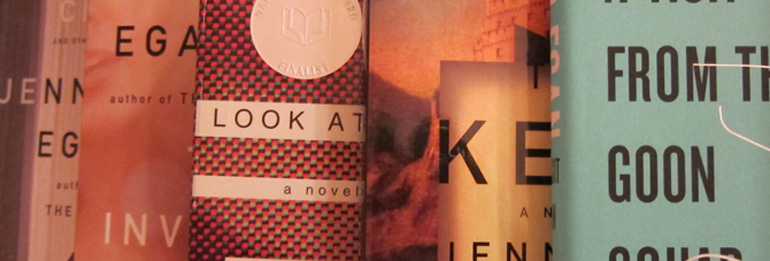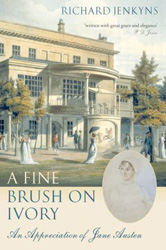Gotham Diary:
Elective
21 September 2011
Wednesday, September 21st, 2011
Although he approves of the way that the writing table has been arranged overall, Ray Soleil does not care for the side-by-side vases. “It looks like a shop,” says he. I say that it’s a variation on urns. The yellow one was purchased in Key West for next to nothing; I’d have bought two if I’d thought I could pack them safely. Placed between yourself and the source of daylight, it becomes a second sun. The crystal number on the right is Steuben. I believe that it was presented to Kathleen’s father upon the achievement of some large project or other. Now Steuben itself s’achève. Only the other day, I was looking at their latest catalogue, all unaware that the famous producer of luxury goods was about to be shut down, but troubled nonetheless to see that their latest tchotchka was a crystal cupcake. A crystal apple I can see. Apples are naturally firm. Not so buttercream frosting. It was, evidently, a portent.
***
I saw Drive yesterday, and I really liked it! I don’t know why Anthony Lane, writing in The New Yorker, finds it unnecessarily gory. Los Angeles is a terrible place! Beautiful in its way, perhaps, but all but overtly savage. I’m speaking, of course, of the mythical Los Angeles that has inspired filmmakers since the days of film noir. Drive feels like American Gigolo, as reconceived by David Lynch. Moments of violence are just that, compressed into short bursts that never last as long as a minute. And they are always backed up, as it were, by ghastly people, notably Albert Brooks and Ron Perlman. I can’t resist suggesting that Nino is the role that Mr Perlman was misbegotten to play; and, as for Albert Brooks, it’s as though the dark swarm of mayflies that consistently blotted all sunniness out of his many comedies were finally openly acknowledged as his company of familiars, so that, for once, the actor doesn’t come across as neurotic. He’s not fussy this time; he’s demanding. There’s a big difference.
Nicholas Winding Refn’s finest directorial decision was to leave the cops out of it altogether. (We see them in the opening getaway caper, mostly through windshields; but the protagonist’s appearance in costume as a stunt driver is the last time that we see a uniform in this study of Angeleno lawlessness.) In the absence of officers of the law, Nino and Bernie (Mr Brooks) roam the earth unchallenged — at least until they run into the Driver (Ryan Gosling). Refn’s most interesting decision is to film his action story as a sequence of visual panels: I regarded Drive as a graphic movie. Movement is contained within large, fixed frames, and close-ups are as still as Vermeer’s tronies. In the earlier part of the picture, the Driver and Irene (Carey Mulligan) gaze at each other with an impassioned, soon-to-burst self-containment that hasn’t been seen since the silents, and, believe me, they reinvent the look. They pause on the verge of embrace, savoring every imaginable aspect of what it will feel like to kiss. (And when they do, it’s not just a kiss, but also an adieu and a feint.) It’s quite as though the film has stuck in the sprockets and is about to burn (a feature of moviegoing that has gone the way of the silents).
***
Are we at war with the United Kingdom yet? Just saying. Have you read Janet Malcolm’s piece on large-format photographer Thomas Struth yet? It’s in the current issue of The New Yorker (dated Sept 26), and the last paragraph on page 95 is where you want to start reading. Turn the page to find out how far you get before the magazine falls from your grip. I’ll spare you Thomas Struth’s “coarse reference to the royal bosom” — but note Malcolm’s incredibly sneaky manner of telling us exactly how, in former times, she would have been constrained to refer to it — and proceed to the second most-offensive paragraph in the piece, which is, again, about Queen Elizabeth, who together with her husband the Duke of Edinburgh are the subjects of a photograph commissioned by Britain’s National Portrait Gallery.
My first impression was of a vaguely familiar elderly couple posing for a formal portrait in a corner of the palatial Minneapolis hotel ballroom where their fiftieth wedding anniversary is being celebrated. The pair were seated on an ornate settee, and my attention was drawn to the woman’s sturdy legs in beige stockings, the right knee uncovered where the skirt of her pale-blue silke dress had hitched up a bit as she settled her ample figure into the settee; and to her feet, in patent-leather pumps planted firmly on the fancy hotel carpet. Her white hair was carefully coifed, in a sort of pompadour in front and fluffy curls on the sides, and her lipsticked mouth was set in an expression of quiet determination. The man — a retired airline pilot? — was smaller, thinner, recessive. They were sitting a little apart, not touching, looking straight ahead. Gradually, the royal couple came into focus as such, and the photograph assumed its own identity as a work by Struth, the plethora of its details somehow tamed to serve a composition of satisfying serenity and readability.
“Fancy hotel carpet” practically doubled me over. Malcolm has a point: hotels in Minneapolis and elsewhere have appropriated the look of royalty. Question is, can royalty work on a new look? And it must be said that the Her Majesty’s shift, while evidently well made of and of good material, is a house dress.
I finished reading Andrew Thompson’s biography of Elizabeth’s venerable ancestor George II yesterday, and I hope to start writing it up this afternoon. I may have read more into Thompson’s book than is actually there, but I came away impressed by the portrait of a man who thoroughly understood how a world that has vanished worked. That it vanished — that, specifically, the Holy Roman Empire within which George figured not unimportantly for a long stretch of the Eighteenth Century, came to an end well before he had been dead for a hundred years — does not mean that George was a fool to play his cards very well, according to the rules then in force. We can look at his reign as a string of decades during which the cabinet system that currently governs Britain was given the unintended chance to germinate, largely during the king’s absences. That’s easy. Thompson makes us understand why the king was absent: while in England he was already constitutionally constrained to work with ministers who attained power within the Houses of Parliament, whether he liked them or not, George was, as Elector of Hanover, an absolute, if benevolent, monarch. Which would you rather be? I myself would find it much more agreeable to have my untrammeled way in a prosperous principality, with my principal subjects gathering in my palace every Sunday to honor me even when I was in distant London, than to deal with high-maintenance aristocrats of whose manners I could only find presumptuous. I might not be riding the wave of the future, but I’d be sitting pretty.










